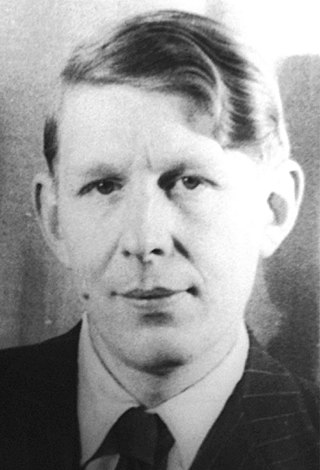
Wystan Hugh Auden was a British-American poet. Auden's poetry was noted for its stylistic and technical achievement, its engagement with politics, morals, love, and religion, and its variety in tone, form, and content. Some of his best known poems are about love, such as "Funeral Blues"; on political and social themes, such as "September 1, 1939" and "The Shield of Achilles"; on cultural and psychological themes, such as The Age of Anxiety; and on religious themes such as "For the Time Being" and "Horae Canonicae".

Edward Benjamin Britten, Baron Britten was an English composer, conductor, and pianist. He was a central figure of 20th-century British music, with a range of works including opera, other vocal music, orchestral and chamber pieces. His best-known works include the opera Peter Grimes (1945), the War Requiem (1962) and the orchestral showpiece The Young Person's Guide to the Orchestra (1945).
Arkham House is an American publishing house specializing in weird fiction. It was founded in Sauk City, Wisconsin, in 1939 by August Derleth and Donald Wandrei to publish hardcover collections of H. P. Lovecraft's best works, which had previously been published only in pulp magazines. The company's name is derived from Lovecraft's fictional New England city, Arkham, Massachusetts. Arkham House editions are noted for the quality of their printing and binding. The colophon for Arkham House was designed by Frank Utpatel.

Arnold Schoenberg or Schönberg was an Austrian-American composer, music theorist, teacher, writer, and painter. He is widely considered one of the most influential composers of the 20th century. He was associated with the expressionist movement in German poetry and art, and leader of the Second Viennese School. As a Jewish composer, Schoenberg was targeted by the Nazi Party, which labeled his works as degenerate music and forbade them from being published. He emigrated to the United States in 1933, becoming an American citizen in 1941.

Jean Genet was a French novelist, playwright, poet, essayist, and political activist. In his early life he was a vagabond and petty criminal, but he later became a writer and playwright. His major works include the novels The Thief's Journal and Our Lady of the Flowers and the plays The Balcony, The Maids and The Screens.
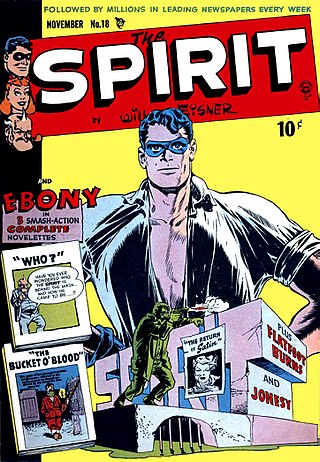
The Spirit is a fictional masked crimefighter created by cartoonist Will Eisner. He first appeared June 2, 1940, as the main feature of a 16-page, tabloid-sized, newsprint comic book insert distributed in the Sunday edition of Register and Tribune Syndicate newspapers; it was ultimately carried by 20 Sunday newspapers, with a combined circulation of five million copies during the 1940s. "The Spirit Section", as the insert was popularly known, continued until October 5, 1952. It generally included two other four-page strips, plus filler material. Eisner, the overall editor, wrote and drew most Spirit entries, with the uncredited assistance of his studio of assistants and collaborators, though with Eisner's singular vision a unifying factor.
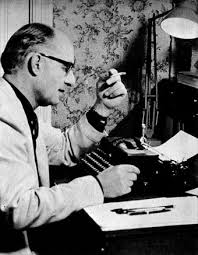
Henry Treece was a British poet and writer who also worked as a teacher and editor. He wrote a range of works but is mostly remembered as a writer of children's historical novels.

Cyril Edwin Mitchinson Joad was an English philosopher, author, teacher and broadcasting personality. He appeared on The Brains Trust, a BBC Radio wartime discussion programme. He popularised philosophy and became a celebrity, before his downfall in a scandal over an unpaid train fare in 1948.
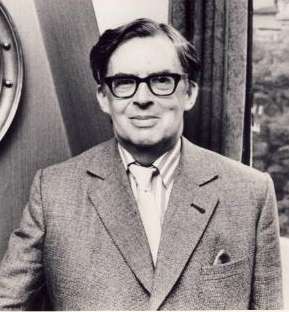
Robert Fordyce Aickman was an English writer and conservationist. As a conservationist, he co-founded the Inland Waterways Association, a group which has preserved from destruction and restored England's inland canal system. As a writer, he is best known for his supernatural fiction, which he described as "strange stories".

Reginald Horace Blyth was an English writer and devotee of Japanese culture. He is most famous for his writings on Zen and on haiku poetry.

Charles Frederick Tunnicliffe, OBE, RA was an internationally renowned naturalistic painter of British birds and other wildlife. He spent most of his working life on the Isle of Anglesey. He is popularly known for his illustrations for the novel Tarka the Otter.
Hans (Heinrich) Keller was an Austrian-born British musician and writer, who made significant contributions to musicology and music criticism, as well as being a commentator on such disparate fields as psychoanalysis and football. In the late 1950s, he invented the method of "wordless functional analysis", in which a musical composition is analysed in musical sound alone, without any words being heard or read. He worked full-time for the BBC between 1959 and 1979.
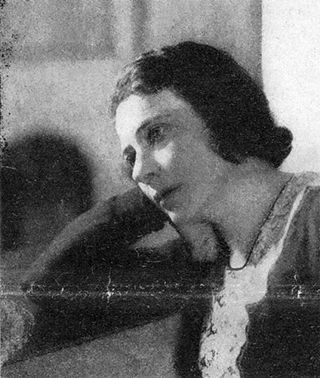
Sarah Gertrude Millin, née Liebson, was a South African author.

Bomba the Jungle Boy is a series of American boys' adventure books produced by the Stratemeyer Syndicate under the pseudonym Roy Rockwood. and published by Cupples and Leon in the first half of the 20th century, in imitation of the successful Tarzan series.
Donald Charles Peter Mitchell CBE was a British writer on music, particularly known for his books on Gustav Mahler and Benjamin Britten and for the book The Language of Modern Music, published in 1963.
This is a bibliography of books, plays, films, and libretti written, edited, or translated by the Anglo-American poet W. H. Auden (1907–1973). See the main entry for a list of biographical and critical studies and external links.
Charles Christopher Lloyd was a British naval historian, who served as Professor of History at the Royal Naval College, Greenwich, 1962–1966.
Manoug Parikian was a British concert violinist and violin professor.
A Charm of Lullabies, Op.41 is a song cycle for mezzo-soprano with piano accompaniment by Benjamin Britten. It consists of five songs composed on poems by William Blake, Robert Burns, Robert Greene, Thomas Randolph and John Phillip. It was written in 1947 for Nancy Evans, who gave the first performance with Felix de Nobel (piano) at a festival in The Hague 3 January 1948. The score was first published in 1949 by Boosey and Hawkes in London.
Herbert Arthur Hodges was a British philosopher and theologian. He was Professor of Philosophy at Reading University from 1934 to 1969.











